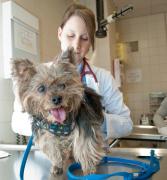Conversations About Research at AMC

Conversations About Research at AMC
On September 21st, the Animal Medical Center hosted its annual “Cocktails and Conversation” event, which this year featured some of the AMC staff veterinarians involved in clinical research. Each researcher spoke about their current project and how the results of the study will benefit pets. Here are some of the highlights.
Cancer Research at AMC
During the entire month of October we are celebrating the opening of the Cancer Institute at the Animal Medical Center and, as part of this celebration, all blogs this month focus on some aspect of cancer in pets. At “Cocktails and Conversation,” Dr. Nicole Leibman, chief of the Cancer Institute at the AMC, spoke about several clinical trials in progress at AMC for dogs with lymphoma. Lymphoma is the most common type of cancer treated by oncologists at AMC, and better treatments which offer longer survivals are desperately needed. The lymphoma clinical trials investigate harnessing the immune system of the patient to help clear the tumor cells from the body. Similar drugs are available for human patients with lymphoma. These trials involved collaboration between veterinary oncologists around the country to accrue enough canine patients to make a determination about the effectiveness of the treatment.
Complementary and Alternative Medicine
Dr. Leilani Alvarez, head of AMC’s Tina Santi Flaherty Rehabilitation & Fitness Service, is currently completing a blinded, placebo controlled trial of a medical device called the Assisi Loop. This type of trial is considered the pinnacle of clinical trial design. The Assisi Loop emits electromagnetic waves and treats musculoskeletal disease. To eliminate bias on the part of pet owners and veterinarians observing response to treatment with the Assisi Loop, the company provided functional loops and some nonfunctional loops. The nonfunctional loops look just like the real deal, but they don’t emit any electromagnetic waves, hence they are considered a placebo treatment. Because no one knows which loops work, the study is considered to be “blinded.” When the results of the study become available, the functionality of the loops will be unveiled and any treatment benefit determined without confounding observer bias.
Studying Teeth and Gums
New and better treatments for old diseases like gum disease are as important in pets as in people. Dr. Django Martel of AMC’s Dentistry Service competed successfully for funding from the American Kennel Club’s Canine Health Foundation. This prestigious recognition allows Dr. Martel to study three different treatments for gum disease in dogs: deep dental cleaning of under the gumline and application of two different antibiotic gels under the gumline after cleaning. Veterinary technicians measuring the impact of treatment are blinded to treatment groups of each patient to ensure an accurate determination of the results can be made. This study is still undergoing patient enrollment and interested pet owners can read more on AMC’s website about our clinical trials.
New Insights Into Collapsing Trachea
Tracheal collapse occurs commonly in small breed dogs and results in multiple hospital stays when respiratory distress occurs. Dr. Chick Weisse, head of AMC’s Interventional Radiology Service, discussed his work with the non-invasive placement of tracheal stents to hold open the area of tracheal collapse and improve respirations. Because of AMC’s enormous caseload, he now recognizes different patterns of tracheal collapse in dogs and can implement new and more advanced treatment for dogs suffering from this debilitating condition.
If you are interested in participating in a clinical trial at AMC, you can view an up-to-date list on our website.

































